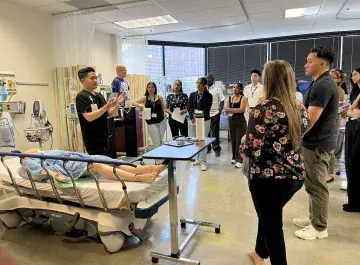Stop Nurse Burnout Before It Starts

Nurses and the profession of nursing are at a turning point. They’re burning out at higher rates than ever before, resulting in less engaged patient care and many nurses leaving the profession, according to Richard MacIntyre, a nursing professor in the RN to BSN program.
In the wake of the COVID-19 pandemic, 84% of registered nurses report experiencing burnout, and just 42% feel their employer values their mental health, according to the American Nurses Association. Even more troubling is that the next generation of nurses, those under age 35, are leaving the profession at almost double the rate of others.
SMU is at the forefront of trying to provide tools for nurses to build resilience. We asked MacIntyre to explain.
You developed a course, Mindfulness-Based Stress Reduction (MBSR) and the Neuroscience of Change, that’s at the heart of this initiative. What is it?
MBSR is an eight-week course teaching mindful yoga, body scans, and several different types of meditation. The course gives students a firsthand introduction to Watson’s Caring Science, a trans-disciplinary approach to the art and science of nursing that includes concepts from the fields of philosophy, ethics, ecology, and mind-body-spirit medicine, the core framework of the RN to BSN program.
Is it new? It sounds innovative.
It is innovative. Currently, SMU is one of only four schools in the country that is an affiliate of the Watson Caring Science Institute, along with leading hospitals and healthcare systems such as Cedars-Sinai, Stanford, and Kaiser Permanente.
We started offering MBSR to our RN to BSN students in 2016. It’s been so successful that we’re now piloting it with our Entry-Level Master of Science in Nursing students this year and plan to extend it to the Accelerated Bachelor of Science in Nursing and Bachelor of Science in Nursing programs next year.
How does MBSR address burnout?
Like on airplanes, we teach nurses to put their masks on first before helping others. Burnout happens when nurses lose sight of their relationships with patients. MBSR is the mask. It helps nurses open a space to reconnect with themselves and get back in touch with what first drew them to nursing. In turn, that reconnection supports a still, authentic presence with their patients.


